Air Washer
Air washers are cooling and heating appliances useful in various spaces. They remove dust and other pollutants from the air. Here is an expert guide for choosing the most compatible air washer, whether for individual purchase or bulk orders.
Expert Guide to Selecting and Pricing Air Washers
An air washer is a device that sprays water vapor through the air to freshen up and humidify. Before purchasing any HVAC system, you should determine the most compatible system according to the intended space dimensions, budget, needs, etc., so you’ll need a technical guide for the best selection. An air washer is a device that sprays water vapor in the air to freshen up, humidify, and sometimes cool the air. Air washers can be used as an independent device or as part of another air conditioning unit.
There are two main types of air washers, apartment and industrial, which are offered in horizontal, vertical, front spray, and face-up models, equipped with or without a heating coil. They can be used in most cities of the Middle East that have dry weather in summer (relative air humidity is less than 40% to 45%).
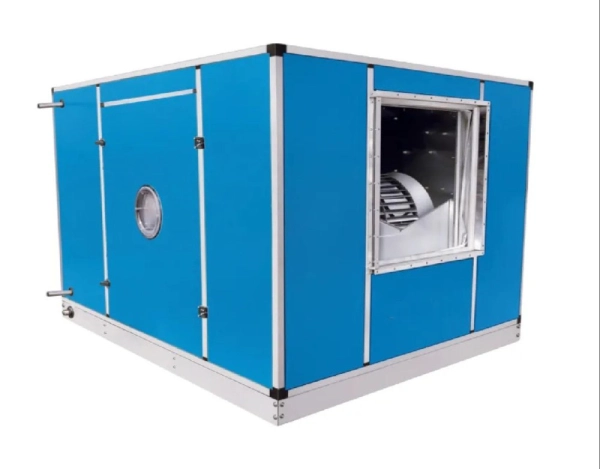
Review, Selection, and Pricing of HVAC Equipment
Air Washer Applications
Air washers are useful in apartments, offices, and especially industrial environments and factories in cities of Tehran, Sulaymaniyah, Erbil, Mosul, Kirkuk, Aleppo, Mrgashat, Armavir, Antalya, Ankara, Mazar-e-Sharif, Kabul, etc. that do not have humid and muggy weather in summer, to provide cool air in summer.
They are also helpful as a heat generator by installing a suitable hot water coil to use the pleasant heat in the cold seasons of the year.
Where Is an Air Washer Suitable for Use?
An air washer is suitable for use in residential apartments, office buildings, seminar halls, industrial workshops, sports facilities, banquet halls, mosques, religious halls, cinemas, theaters, greenhouses, and similar spaces in cities such as Tehran, Isfahan, Semnan, Shahroud, Shiraz, Mashhad, Kermanshah, Sanandaj, Hamedan, Arak, Tabriz, Karaj, Qazvin, Sulaymaniyah, Erbil, Mosul, Kirkuk, Aleppo, Ankara, Mazar-e-Sharif, Kabul, and other regions that do not experience hot and humid summer conditions.
In these areas, air washers are an efficient solution for providing cool air during summer by utilizing the evaporative cooling method.
In addition, by installing a hot water heating coil with a properly calculated heat transfer surface at the air outlet and supplying the required hot water from a central boiler room, air washers can also deliver comfortable heating during the colder months of the year.
Review and Selection of Air Washers
Air washers can be categorized based on capacity and performance, application type, and installation location, as outlined below:
Air Washer Classification Based on Capacity and Performance:
In general, air washers are divided into three main classes:
- Class 4 air washers
- Class 6 air washers
- Class 8 air washers
Air Washer Types Based on Application:
From an application standpoint, air washers are classified into two main groups:
- Industrial air washers
- Residential (domestic) air washers
Air Washer Types Based on Installation Location:
According to their mounting and installation method, air washers include:
- Floor-standing air washers
- Ceiling-suspended air washers
- Rooftop-mounted air washers
Each of the above-mentioned air washer types will be explained in detail in the following sections and should be selected for each project based on proper engineering evaluation and professional consultation.
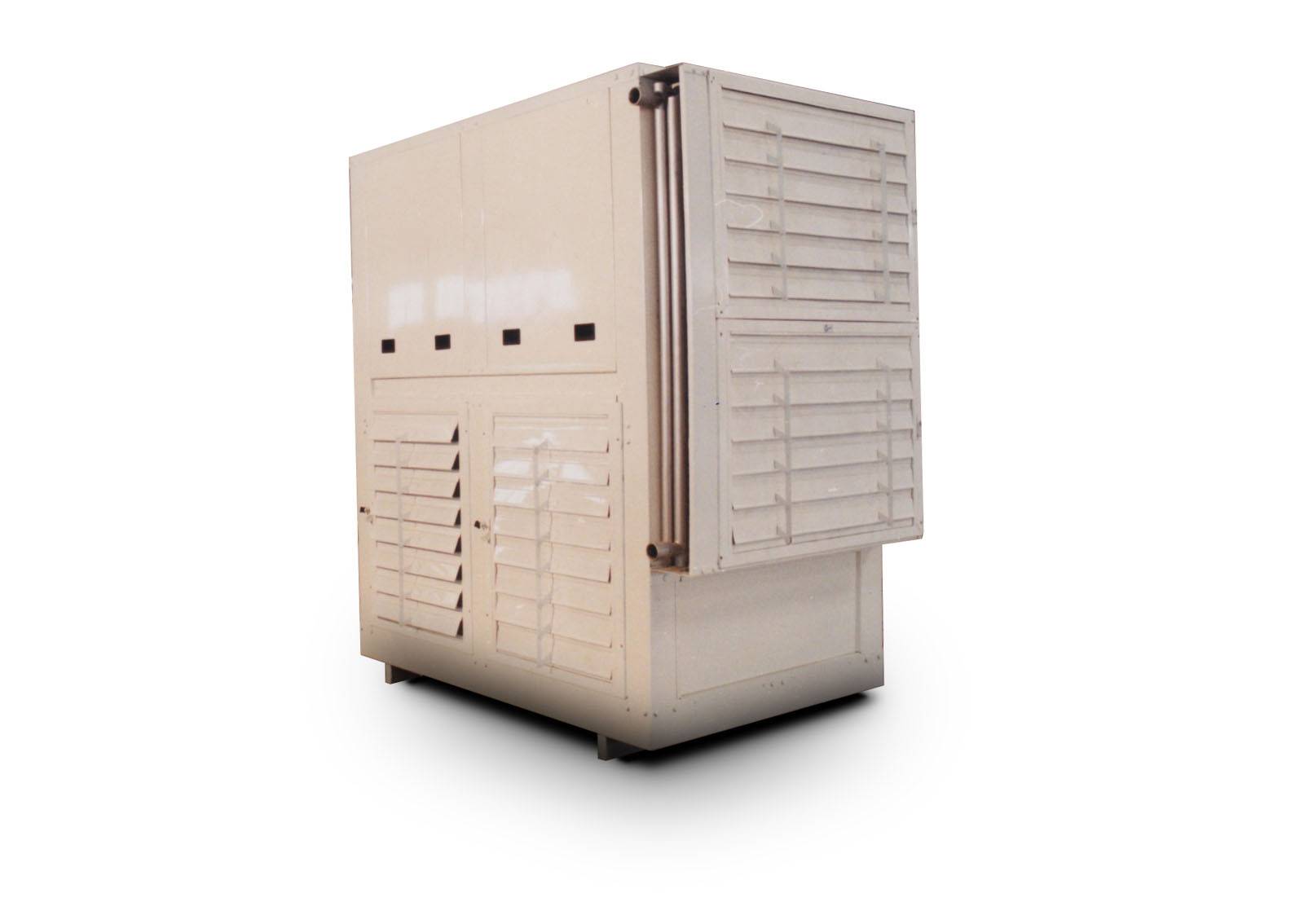
Air Washers Types
Air washers can be categorized into different types in terms of power and efficiency, application, and installation location:
- Air washer classification in terms of power and efficiency: In general, air washers are divided into three main classes, which are class 4, class 6, and class 8 air washers.
- Types of air washers according to their usage: To classify air washers according to their use, they can be divided into two groups: industrial and household air washers.
- Airwasher types in terms of installation location: Based on the installation placement, air washers include standing, under-ceiling, and rooftop air washers, which must be selected based on expert advice and tailored to each project.
Types of Air Washers in Terms of Power and Efficiency
In general, air washers are divided into three classes, which are as follows:
- Air Washer Class 4: Class 4 air washers have a row of nozzles with a flow rate of 4 GPM per 1000 cfm of passing air
- Air Washer Class 6: In these air washers, the flow rate of water per 1000 cfm of passing air is 6 GPM
- Air Washer Class 8: These air washers also have more nozzles with a flow rate of 8 GPM per 1000 cfm of passing air
Types of Air Washers in Terms of Usage
There are two types of air washers based on their usage: industrial and domestic. Here are both types in more detail:
Industrial Air Washers
Industrial air washers clean the air from pollution and dust with proper filtration. They transfer pleasant and clean air to the units, spending the least cost and electrical energy.
In industrial, commercial, and office environments, due to the wider space or high ceilings, a larger volume of the returned air from the building enters the air washer again and mixes with the fresh incoming air.
Therefore, in commercial areas, industrial air washers with larger dimensions and power are used. Some industrial air washer applications are in industrial sheds, greenhouses, exhibitions, warehouses, universities, department stores, sports halls, etc.
Domestic or Home Air Washers
The mechanism and operation of home air washer devices are similar to those of industrial models. The only different factor is the dimensions of the domestic and commercial airwashers. Home air washers are smaller than industrial models, called apartment or home air washers. These devices are produced in horizontal, vertical, and front-blowing models.
Household air washers are installable in different spots, such as balconies, terraces, roofs, and patios in residential buildings, and connected to each unit through ducting due to their small space occupation. It should be noted that home air washers provide independent air conditioning of each unit. By connecting them to the engine room hot water coil or wall package, in addition to the cooling function, they can be used for heating in the cold months of the year.
Of course, air washers need to implement an internal air return channel and use the return air from the indoor environment to provide warm air in the cold months of the year (unlike their summer performance, which must use 100% fresh air). Otherwise, their hot water coil should be calculated and implemented many times stronger so that it can fully warm and direct one hundred percent of the cold air in the environment in winter.
Types of Air Washers in Terms of Application
In terms of application, there are three main types of air washers. Standing, ceiling, and rooftop air washers.
Standing Air Washer
As its name suggests, the standing air washer is installed in a standing position. This device can be installed in most places, but usually, it is placed on the roof or inside the balcony of the building, and cool air in summer and warm air in winter (with return air duct from inside) is transferred to the units through ducting. They do. Standing air washers are offered in face-up or overhead models with or without heating coils.
Ceiling Air Washer
Ceiling or under-ceiling air washers are usually installed in the balcony ceiling or inside the false ceiling of the building. Like other kinds of air washers, they require air ducting to direct and transfer fresh and clean air to the units of all residential, office buildings, etc.
Rooftop Air Washer
The rooftop air washer is a type of standing air washer installed vertically on the roof, and its function is the same as other air washers, using ducting of outgoing air in summer and return and outgoing air in winter.
Econopack Air Washer
Whenever hot water is inaccessible to provide heating by air washers, Econopack air washers are the best. An Econopack Air washer is a device that performs like a hot air furnace to provide heating.
In this way, a gas or diesel burner is installed in the device, the resulting flame heats the furnace, and finally, the exhaust air is heated by passing through the combustion chamber of the air washer. There is no need for a spa engine room to heat the spa coil and the exhaust air. It is not an air washer.
DamaTajhiz: Thousands of products for thousands of projects (since 2004)

How Do Air Washers Work?
An air washer or air cooler can provide cool, fresh air in summer. Moreover, if a heating coil is placed in the airflow path and the air return channel is implemented from the inside, providing warm air in winter will be possible.
On the other hand, due to the presence of an air filter in the airflow path of the air washer, a large part of the dust, pollution, and allergenic substances in the air are easily removed and absorbed.
Therefore, the cool or warm air blown by the air washer is clean and pure. Moreover, since the water inside the air washer is heated to a great extent and turns into steam, this steam is combined with cool or warm air inside the machine, and its relative humidity increases. For this reason, the air washer is a suitable option only for use in areas with dry and semi-arid climates.
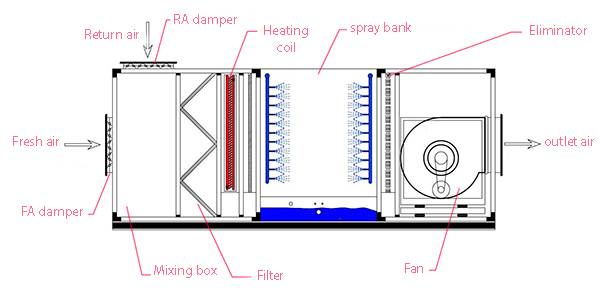
In the following, the cooling and heating operation of the air washer is described component by component:
Air Washer Cooling Performance
In summer, the hot air from the outside is sucked into the device by the air washer fan, and by passing through the air filter installed in the device, the filter absorbs a significant part of the dust in the air. Then, this air volume enters the main chamber of the air washer for cooling.
Reducing the air temperature in the main chamber of the air washer is done by spraying water powder by nozzles or sprinklers and by evaporative cooling. At this stage, in addition to reducing the air temperature, the remaining dust particles and other pollutants in the air are removed from the air by coming in contact with the water powder particles sprayed from the nozzles, and finally, cool and clean air comes out from the air washer.
Air Washer Heating Function
In winter, air washers provide warm air in the building by passing the return channel air from inside (along with a percentage of fresh outside air) over the hot water coil built into the device (which is heated by the central engine room boiler or heating package).
This way, the air inside the air washer device is blown on the surface of the coil containing hot water, and its temperature increases. Meanwhile, the temperature of the hot water in the coil is reduced, and it is returned to the heating package or the hot water boiler of the engine room through the return pipe. Then this hot air enters the ducting by the fan and is blown to the units from there. This cycle, or cycle, flows continuously inside the air washer.
Note that the heating function of the air washer can be implemented in two ways: combined and fully fresh. The full-carpet mode means that all the air required by the device is supplied from the fresh air of the outside environment. But in the combined mode, part of the air required by the device is supplied from the air inside the unit (through the air return channel) and the rest from the outside air.
Air Washer Capacity Calculation
Some of the purchase orders for air washers are apartment air washers with a capacity of up to 7,000 CFM (equivalent to 11,900 M3/hr) and for use in other cases mentioned above, air washers in classes 4, 6, and 8 with capacities of 7,000 to 100,000 CFM (equivalent to 170,000 M3/hr) is welcomed by experts and engineers of projects in the above climatic conditions.
Since the cooling function of air washers is based on the evaporation process of water (like water coolers) and only by supplying 100% fresh air from the outside environment; therefore, air washers should not be expected to produce dry cooling like condensation or absorption cooling systems or split ducts and splits.
Recently, some air washer manufacturers, to reduce the temperature of the water and consequently reduce the temperature of the cold air coming out of the air washer, based on the customer's order, calculated and installed an additional compression refrigeration system to reduce the temperature of the spray water entering the main chamber of the air washer, which with this method practically they create a combination of condensation and evaporative cooling system, and as a result, while improving the cooling of the air washer, the amount of moisture added to the air coming out of the device is also reduced.
The Main Components of an Air Washer
Air washers are placed independently or in interaction with the rest of the building's air conditioning system and include:
- The Body: usually made of galvanized sheet with electrostatic paint coating.
- The Electric motor: The electric motor and fan which is selected according to the capacity and volume of aeration, as well as the static pressure required to pass air from the channels to the air exit valves in the rooms.
- Air purification filters: including all kinds of bag filters, washable aluminium filters, and in hygienic air washers, HEPA, carbon, etc., filters are used.
- Water pump and nozzles: they are responsible for spraying high-pressure water and powder in the air washer machine.
- Air distribution dampers: usually installed with manual and automatic control types and are responsible for distributing air completely uniformly in the air distribution channels.
- Hot water coil: in winter, it is responsible for heating the exhaust air of the air washer.

How Effective Is the Cooling Performance of an Air Washer?
One of the most important questions about an air washer concerns the maximum temperature reduction it can achieve. Air washers are classified as evaporative cooling systems, meaning that air cooling is accomplished through water spraying and evaporation. In such systems, the cooling capacity is highly dependent on the local climatic conditions, and therefore a single fixed temperature reduction value cannot be defined for all cities.
In general, all evaporative cooling systems—such as air washers, evaporative air coolers, and Zent units—under optimal conditions can reduce the air temperature to a maximum of approximately 3°C above the local wet-bulb temperature.
The wet-bulb temperature is an index that reflects both air temperature and relative humidity and is the primary factor determining the cooling efficiency of an air washer.
However, as the most complete evaporative cooling system compared to conventional air coolers and Zent units, the air washer is capable of supplying cooler air during summer. Moreover, if the airflow capacity, duct dimensions, motor power, fan static pressure, and overall system design are properly calculated and executed, an air washer installed in hot and relatively dry climates can reduce indoor temperatures to around 25°C, which is considered a comfortable summer condition. For example, the summer wet-bulb temperature in Tehran is approximately 23°C.
What Does “Cooling Capacity” Mean in an Air Washer?
Cooling in an air washer is achieved through temperature reduction caused by water evaporation, which is fundamentally different from the cooling capacity of mechanical refrigeration systems.
This cooling method is typically evaluated based on the temperature difference between inlet and outlet air, the airflow rate through the air washer, and ambient environmental conditions, and it is not expressed in terms of BTU or refrigeration tons.
Factors Affecting the Cooling Performance of an Air Washer
The cooling performance of an air washer is influenced by a combination of environmental and technical factors, including:
- The most critical factor is ambient temperature and relative humidity. The drier the air, the more effective the evaporation process, resulting in higher cooling capacity.
- Consequently, air washers perform very efficiently in dry cities such as Yazd and Kerman, where they can reduce the inlet air temperature by approximately 70–80%, whereas in humid regions such as Rasht or Bandar Abbas, the temperature reduction is usually limited to around 20–30%, which is generally considered inadequate.
- In addition to climatic conditions, motor power, air handling capacity, airflow rate, air velocity, type and quality of water spray nozzles, uniformity of water distribution, and internal design of the air washer play a significant role in determining cooling effectiveness.
Furthermore, fan power and static pressure, water pump capacity, filter cleanliness, and the absence of scale or clogging in spray nozzles have a direct impact on the final cooling efficiency of the air washer.
In projects where the cooling capacity of an air washer does not meet the required indoor temperature conditions, the use of alternative systems such as chillers combined with air handling units (AHUs) or fan coil units is typically recommended. Unlike air washers, these systems are not directly dependent on climatic conditions and can achieve any required temperature level, while also providing humidity control, albeit with higher initial costs and energy consumption.
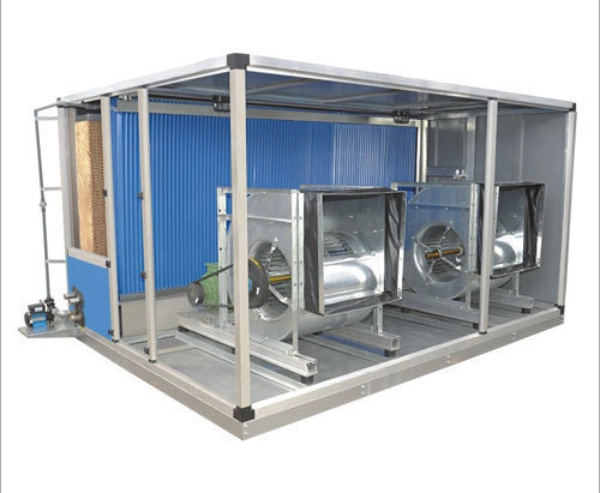
How to Choose the Most Suitable Air Washer?
There are, of course, many factors to consider when choosing an air washer; some are personal preferences, and some are technical requirements. But the following are the most important factors you do not want to miss:
- Aeration volume (m³/h - CFM).
- Installation experts should define the required aeration volume, motor power, and static pressure.
- Forward or upward ventilation of the device.
- Placing the required air washer horizontally or vertically based on the project.
- Having or not having a heating coil and determining its capacity and thermal level.
- Installation location, conditions, and how to install the air washer in the building.
- Accurate calculations and basic implementation of the air distribution ducted system of air washers according to engineering calculations and based on the volume and speed of passing air at each section of the channel using a duct worker and according to the standards of changing the angle and radius of the internal arc in the ducts.
Air Washer Advantages
Air washers may have countless benefits and advantages compared to other ACs, but most of them are those we have listed here:
- Optimum power consumption results in lower costs (electricity in summer and gas in winter) compared to compression systems with compressors.
- Optimized water consumption compared to evaporative coolers.
- Providing the moisture needed by the building and residents in the dry heat of summer.
- Air washers' maintenance and spare part costs are much lower than systems such as ducted/ductless split air conditioners and chillers.
- Due to the capability of heating and cooling (all-in-one AC), multiple room devices' operational problems and maintenance expenses (heaters and fan coils) are eliminated.
- Removing heating water risers and pipes from the floor, thus reducing the issues of thick flooring and reducing the dead loads of the building.
- Using the dead space above the false ceiling to distribute air through ventilation channels.
- The possibility of installing the air washer centrally in remote areas of the building, and the ease of access for repairs and maintenance.
- The ability to control heat and humidity and use fresh air outside in summer and winter.
- Use of single-phase electricity, especially in apartment systems: most compression systems (such as ducted/ductless split ACs) with a capacity of 36,000 BTU and above use three-phase electricity. For example, using a ductless or ducted AC requires three-phase electricity for an apartment of about 100 square meters and above. In the case of using an air washer, there is no need for three-phase electricity even for 300 square meter apartments.
- Appropriate and reasonable initial cost, especially in large spaces, as the size and volume of the building space increase, the difference in the initial price and the difference in electricity and energy costs between the air washer and condensation systems increase. For example, cooling and heating large spaces such as mosques, halls, factories, and sheds using compression systems (such as central heating boiler units, water-cooled and air-cooled chillers, mini chillers, etc.) is costly. It should also be noted that the initial cost of buying and installing these devices is high, but air washers can be used at a cost of even one-tenth of these systems.
- Air washers can heat up or cool down the place rapidly, which means they are suitable for places where their use is inconsistent (schools, mosques, etc.). Furthermore, in residential buildings, there is no need for the system to be permanently on when residents are not present, which reduces energy consumption. Moreover, due to the powerful blower of air washers, heat and cold are distributed homogeneously and uniformly in the building.
- The high-pressure spraying of water molecules in the air washer device and the passage of air through them cause a significant amount of dust and other pollutants in the incoming air to be absorbed, and clean air to be transferred to the indoor environment.
DamaTajhiz; Guide to Selection and Pricing of HVAC and Building Facilities Equipment (Since 2004)
Disadvantages of Air Washers
Just like everything else, air washers come with a few disadvantages. Some of them are as follows:
- The air washer's cooling function does not have the quality of ductless split units, ducted ACs, or chillers. The cooling efficiency of the device decreases, particularly during very hot hours of the day or on very hot days in tropical cities such as Qom.
- For uses with a lot of heat generation (such as cooking areas, densely populated areas, and anywhere there is water vapor), the cooling of the air washers must be increased to the necessary quality.
- Water creates its own set of issues, particularly in the maintenance of devices.
- These devices will not provide adequate cooling in humid areas such as Ahvaz, Bushehr, Bandar Abbas, Basra, Baghdad, Karachi, Damascus, Najaf, Karbala, Dubai, Abu Dhabi, Kuwait City, Riyadh, etc.
- In humid and humid areas (such as north and south of Iraq) with air humidity above 45%, air washers cannot be expected to provide adequate cooling in summer.
- The necessity of calculating and implementing the air return channel to save the heat required by the air washer spa coil in winter. If the air washer is installed outside the space or the false ceiling of the relevant unit or on the roof of the project, more than 80% of the air entering the device should not be supplied from the cold air outside the building in winter; Because if the air inside the building is not returned to the air washer, the consumption and waste of energy in the air washer will increase a lot.
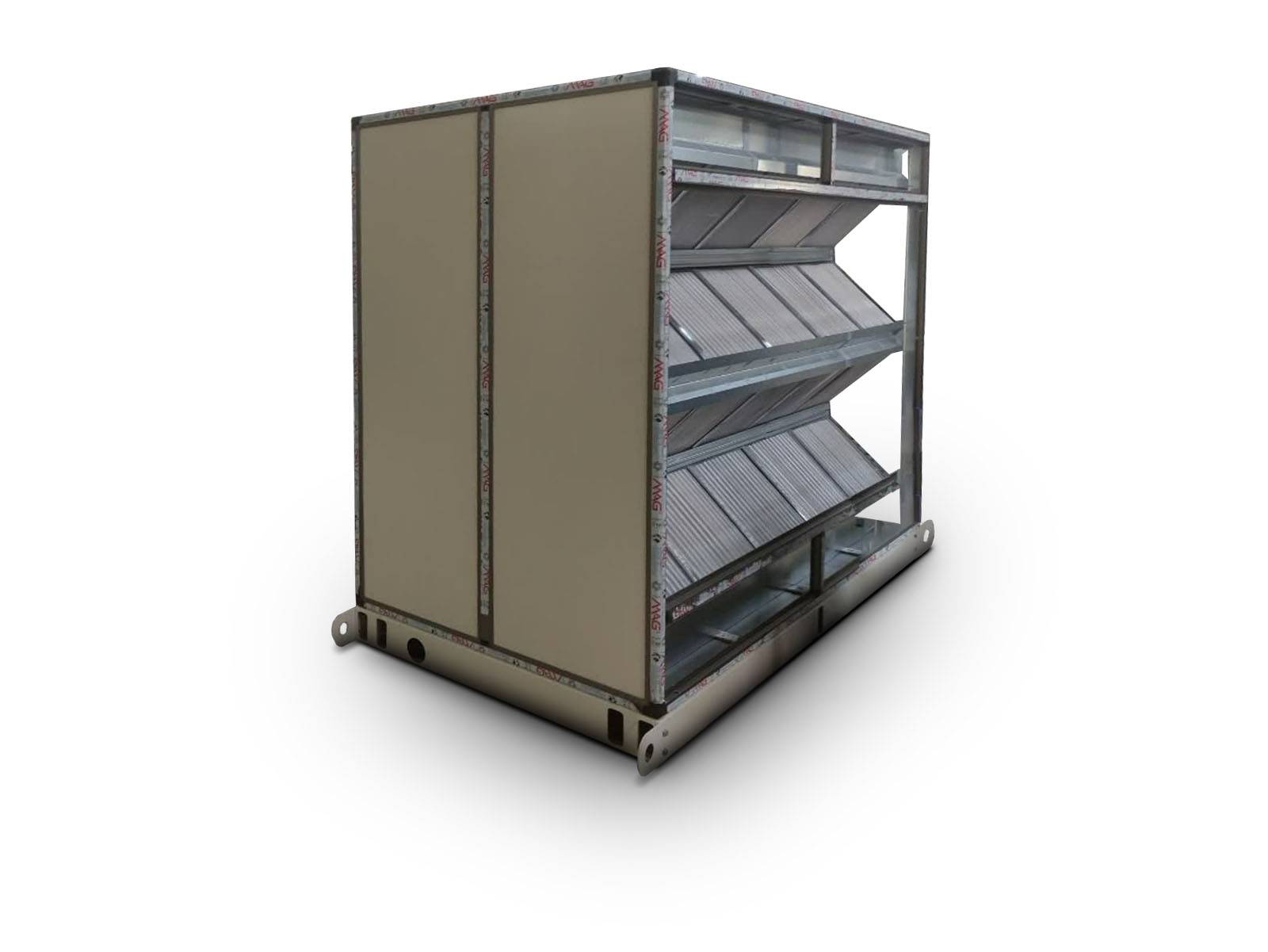
Technical Terms of Air Washers
Here are the four most important technical terms we think you should know about:
Dehumidification of Air Washers
Dehumidification in the air washers is possible when the temperature of the sprayed water is lower than that of the incoming humid air. The colder the sprayed water is, the more dehumidifying it is, and the cooler and fresher the air becomes.
Corrosion Control of Air Washers
Corrosion control is crucial in any metal system that works with water. Carbon dioxide, sulfur dioxide, and other corrosive gases can cause serious problems when dissolved in water. All of these materials form a mild and dilute acid that easily attacks unprotected surfaces and causes corrosion, and one of its characteristics is a pressure drop in the nozzle.
To correct this situation, they create an anti-corrosion coating on the metal surface, which, in this case, increases the pH of the water to about 9. This pH neutralizes surface acids and delays the growth of bacteria in the air washer system.
Oil Vapor Control in Air Washers
The oils present in the air vapor are created from the operation of machinery at high speeds. Oil particles cause a malfunction in the system, and oil separators can solve this problem. These materials take the oil from the mud and dirt of the water, bring it to the water's surface, and take it out of the system with an overflow. If oil remains in the system, the system reaches a point where it is forced to shut down.
Odor Control in Air Washers
The air washer gives air to the area that people breathe, so the air must be clean and free of odor and pollution. Air washers quickly become slimy and smelly. To solve this problem, they use low-smelling oxidizers such as hydrogen peroxide and bromine, which are injected into the air washer system twice a week.
Extra: Evaporation systems such as Air washers and Zent units are great for hot and dry areas. These systems are more affordable than compression refrigeration systems (ductless or ducted ACs and chillers), especially for large buildings with high ceilings, such as halls, mosques, sheds, loft houses, etc. The cost of electricity consumed by these devices is less than a quarter of ducted/ductless split air conditioners and chillers.
Air Washer Buying Guide
The first step to buying an air washer should be to pay attention to the cooling capacity and the dimensions of the installation location.
Air washers are produced and supplied in different types with different cooling and ventilation capacities. Therefore, to choose the right aeration capacity, model, and price of the air washer you need to buy one, consider your desired space’s dimensions and residential status.
After that, things like energy consumption, features, brand, and benefits of the relevant air washer should be examined.
On the DamaTajhiz HVAC website, technical information of dozens of models of air washers from different reliable brands with original warranties has been presented for you to enjoy the good feeling of optimal and smart shopping for wholesale purchases.
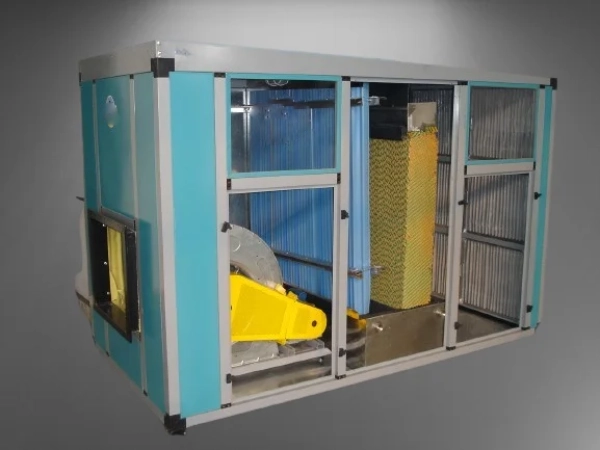
Air Washer Price
The price of air washers can vary greatly based on the type of capacity and brand. All the air washers presented on DamaTajhiz HVAC Group's website have product IDs, reasonable prices, and discounts, which are already included.
Also note that in the specialized HVAC group of Damatajhiz, all the DamaTajhiz air washers are only sold in bulk. Therefore, if you want to wholesale any of these products, contact us.
Factors Affecting the Price of an Air Washer
The price of an air washer depends on a range of variable factors, including the following:
- Air Washer Capacity:
The most important factor determining the price of an air washer is its air flow rate. As the airflow capacity increases, the overall dimensions of the unit become larger, and the power of the fan, pump, and other components increases accordingly, which directly affects the final price of the unit. - Casing and Frame Material:
The type of material used for the air washer casing—such as standard galvanized steel, hot-dip galvanized steel, or stainless steel—plays a significant role in pricing. More corrosion- and moisture-resistant materials naturally come at a higher cost but are better suited for industrial and humid environments. - Fan Type and Quality:
The fan used in an air washer, in terms of brand, efficiency, noise level, and energy consumption, has a direct impact on the price. Higher-efficiency and lower-noise fans are generally more expensive. - Pump Specifications and Water Distribution System:
The quality of the water pump, the type and number of spray nozzles, and the uniformity of water distribution across the airflow are key factors affecting the air washer price. High-quality nozzles and optimized spray systems improve performance and, consequently, increase the unit cost. - Presence of a Hot Water Heating Coil:
The existence or absence of a hot water heating coil, along with the number of coil rows, heat transfer surface area, and fins per inch of the heating coil, are also important factors influencing the air washer price. - Level of Control Systems and Automation:
Air washers equipped with advanced control systems, complete electrical panels, inverters, or connectivity to a Building Management System (BMS) are priced higher than basic models. - Type and Number of Filters:
The use of multi-stage filters, washable filters, or high-efficiency filtration systems for the outlet air can increase the overall price of an air washer. - Manufacturer Brand and After-Sales Service:
The manufacturer’s brand, build quality, warranty period, and availability of after-sales services and spare parts are critical factors that influence the air washer price and should be carefully considered in the final selection.
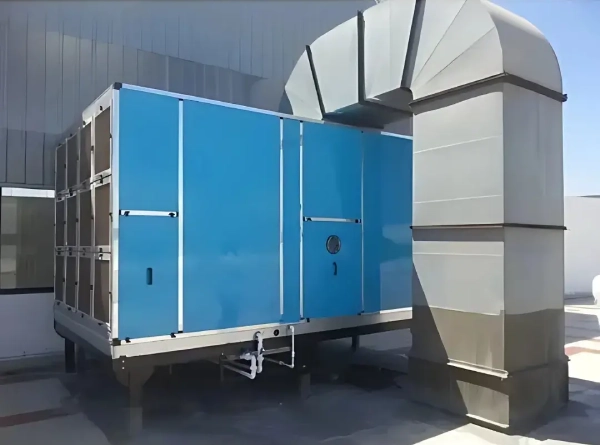
Air Washer Installation Location
Selecting an appropriate location for installing the air washer, whether for residential or industrial units, is a critical issue that must meet certain requirements. Before installing an air washer, the following important yet simple points should be considered:
- The installation location of the air washer should allow for 100% fresh air intake from the outside during the summer and recirculated indoor air during the winter. To achieve this, it is recommended to install the air washer near an openable window, which should be fully open in summer and closed in winter.
- Installing a drainage system with a minimum diameter of 3 inches (7.62 cm) at the installation site is essential, especially for industrial air washers in factories, workshops, and large warehouses.
- The installation location of the air washer should be selected in an area that allows for easy access around the unit for maintenance and repair.
DamaTajhiz; The Best Prices and Brands of Ventilation, Heating, and Building Facilities Equipment (Since 2004)
Air Washer Maintenance Requirements
Proper air washer maintenance plays a direct role in preserving cooling efficiency, ensuring outlet air quality, and extending the service life of the unit. Correct maintenance practices for an air washer include the following:
- One of the most critical maintenance tasks is regular cleaning of the water spray nozzles. Clogging or scale buildup in the nozzles leads to uneven water distribution and reduced evaporative cooling efficiency.
- Air filters in the air washer should be inspected periodically and washed or replaced as required. Dirty filters not only reduce airflow rate but also impose additional load on the motor and fan, resulting in higher energy consumption.
- Inspection of the water sump, pump, and circulation piping is essential to prevent scale formation, corrosion, and the growth of microbial contaminants inside the air washer.
- Routine servicing of the fan, bearings, and electric motor, particularly before the start of the cooling season, ensures vibration-free, low-noise operation and prevents performance degradation.
- The use of clean water with low hardness is one of the most important factors in maintaining optimal air washer performance over time.
Air Washer FAQs
Q: How many degrees can the air washer reduce the air temperature?
A: Usually, if the capacity of the air washer is chosen correctly and there is no problem in terms of dimensions (according to Dactilator), the implementation of ducting, compliance with the radius of the inner arc of the channel, or the standards of changing the direction in the channels, it can reduce the indoor air temperature to several degrees around 26 degrees Celsius.
Q: Is the air washer the same as the water cooler?
A: No, but the type of cool air supply is similar to the water cooler, using the evaporative cooling method, with the difference that the air washer has a more effective and stronger performance than the water cooler.
Q: How much electricity does the air washer machine consume?
A: The electricity consumption of air washers is generally about 1/5 (one-fifth) of the electricity consumption of condensation refrigeration systems in the desired environment.
Q: Would it be possible to adjust the humidity in the air washer system to the desired level?
A: Yes, you can adjust the humidity level of the device as desired by choosing the class of the air washer (class 4, 6, or 8) and then installing the humidistat and steering the device's water pump.
Q: In what places is the air washer suitable for use?
A: Air washers are suitable for use in apartments, residences, offices, healthcare, schools, halls with high ceilings, workshops, exhibitions, etc., whose relative humidity is less than 40% in summer.
Q: Does the air washer need a chiller?
A: No. If you use an air washer, you have chosen the type of evaporative cooling, and you no longer have to deal with the chiller's compression cooling system.
Q: What type of weather is not suitable for using an air washer?
A: As mentioned earlier, using air washers is not suitable for cooling environments where the air has a relative humidity of more than 45% in summer (such as coastal cities).
Q: Can an air washer be used instead of an air conditioner?
A: If you don't have a compression chiller, you won't need an air conditioner because the air conditioner works completely like an air washer in terms of heating function (using a hot water coil in the air passage of the device). But the air washer cools the summer air with humidification without needing a chiller, while the air conditioner supplies the summer air by passing through the cold water coil of the chiller (cooling coil).
Dear user
Suppose you still have more questions about purchasing an apartment or industrial air washer after reading the above information. In that case, you can contact DamaTajhiz HVAC Group by dialing these numbers: 108-117-119-120-126- 317 and get advice from the air conditioning equipment sales experts.
Also, because DamaTajhiz specialized group, as an official member of the Union of Heating and Air Conditioning Equipment Sellers, provides all kinds of air washers in the Middle East region, if you need an air washer for any of the countries in the region, you can place your purchase order with confidence and guarantee. Leave the right product and price to our sales experts.
You can order any HVAC and MEP products, including different types of air washers, cooling towers, air handling units, chillers, industrial evaporative coolers, air curtains, burners, cast-iron or steel boilers, heat exchangers, gas heaters, unit heaters, circulation pumps, sand filters, water and fuel storage tanks, and more, from countries such as the UAE, Armenia, Tajikistan, Georgia, Azerbaijan, Turkey, Oman, Pakistan, Turkmenistan, Afghanistan, Kuwait, Bahrain, Qatar, Iraq, and others across Asia, the Middle East, and Europe, and have them delivered to your city (Manama, Baghdad, Karachi, Dubai, Sharjah, Muscat, Riyadh, Abu Dhabi, Kuwait City, Jeddah, Sana'a, and Doha Amman, Sulaimaniyah, Sofia, Kirkuk, Islamabad, Mosul, Erbil, Dushanbe, Aleppo, Damascus, Baku, Beirut, and Kabul) in the shortest possible time. So, contact us by phone call or WhatsApp message through the number +98-930-288-0251.
"Knowledge Fuels Better Choices"
Registered Trademark and Stewardship Business Licenses Issued by the Union of Virtual Business Association and the HVAC Equipment Industry.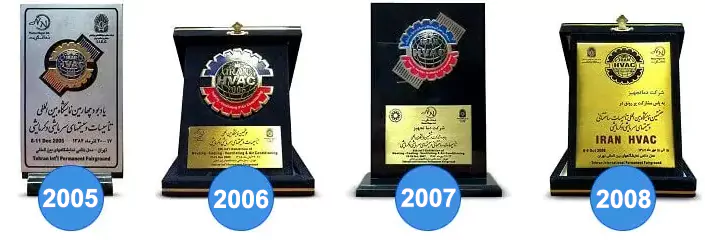
DamaTajhiz HVAC Participation at International HVAC and Construction Facilities Exhibitions Demonstrates its Global Reach and Commitment to the Industry.
We Look Forward to Your Call and the Opportunity to Meet You
SHARE THIS CONTENT TO SPREAD THE KNOWLEDGE
| |
Head Office: No. 463,Talebian Alley,Taleghani St.Tehran,Iran


DamaTajhiz has provided the opportunity to sell and ship specialized HVAC equipment for applicants in the following countries as the first and the most popular online store for selling HVAC equipment (Heating , Ventilation , Cooling , Air conditioning) in the Middle East : Afghanistan – Tajikistan - Uzbekistan – Turkmenistan – Azerbaijan – Armenia – Georgia – Turkey – Iraq – Syria – Jordan – Kuwait – Emirates – Qatar – Oman.
















